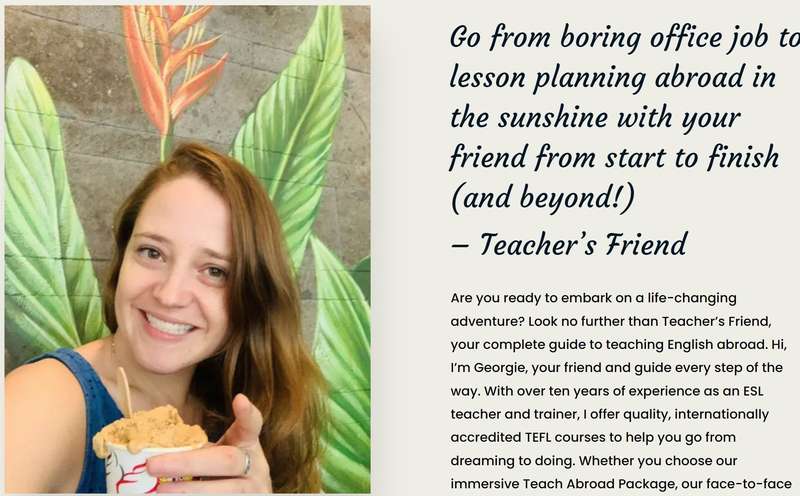Last updated:
There are countless exciting opportunities to live and work abroad, from volunteering on a remote island to working on a yacht. Imagine being a tour guide in a distant locale, serving as an au pair while exploring Europe, or teaching English in a country you’ve only read about in books. Teaching abroad is a popular choice for native speakers, and it’s the main focus of this post.
We’ve spent several years traveling the world as digital nomads. On our first round-the-world adventure together, Charles worked in a greenhouse in Australia, while I edited academic essays and worked remotely as a technical writer. Later, we launched this site and made our living as travel bloggers, which was the result of many years and various short- and long-term contracts.
Over the years, we’ve received numerous emails from readers curious about how to secure a job teaching English overseas. Although we have experience working remotely, we have never taught abroad ourselves. That’s why we consulted with Georgie Snape from Teacher’s Friend, an expert on teaching overseas. In our conversation, she shares invaluable insights on everything from landing your first teaching job to selecting a TEFL course and identifying the best countries for teaching abroad.
Our YouTube video interview with Georgie is now live! Be sure to subscribe to our channel and enable notifications so you never miss an update!
Micki: How did you get into teaching?
Georgie: I can’t recall the exact moment, but my friends told me I had been talking about wanting to teach since I was 14. I guess I’ve always had a desire to travel. I studied community drama, where instead of acting, I facilitated workshops for marginalized groups, which equipped me with many teaching skills.
I recognized that teaching was a great way to travel, and I genuinely love it. After graduating, I worked on my dissertation project while also completing my TEFL course. Looking back, it was a challenging decision, but it prepared me to start teaching right after finishing my degree.
Micki: Where have you taught English?
I began my teaching journey in Vietnam, where I spent three months traveling before returning to teach again. After that, I moved to Australia and New Zealand, which many don’t consider as destinations for teaching English. Yet, numerous locals wish to study abroad or relocate to English-speaking countries, leading to many English teaching opportunities there.
I eventually returned to Vietnam, which has always felt like home. I have also taught in Thailand, Malaysia, Cambodia, and I’m currently in Indonesia.
My initial plan was to teach for six months, and yet here I am, 11 years later. It seems I lost track of time!

Micki: What advice would you give to someone interested in teaching abroad? How can they get started?
Georgie: First and foremost, you’ll need to get qualified. Acquiring a TEFL certificate is essential. It’s important to choose a TEFL course that will best prepare you for teaching.
To keep it simple, my primary advice is to select the right TEFL course. When I was taking mine, I considered what I wanted from teaching abroad, and I came up with four criteria: good salary, lower cost of living, friendly locals, and beautiful scenery. That’s a pretty ideal lifestyle!
I was a bit traditional and bought an actual TEFL guidebook, which I thoroughly read. Nowadays, you can also research countries online, comparing the pros and cons and determining which countries offer the best salaries.
After completing my TEFL, many providers helped with job placement, but some individuals also pay for assistance with everything involved in moving abroad. Your choice depends on your personality and whether you prefer guidance through the process.
Micki: Are there any TEFL courses you’d recommend avoiding, or are there better ones? Are online courses or in-person courses preferable?
Georgie: I always recommend taking an in-person TEFL course, even if you already have teaching experience. Teaching English as a foreign language to non-native speakers is quite different from teaching English to native speakers.

The most surprising realization for students is understanding that the teaching methods they learned in school may not necessarily apply when dealing with non-native speakers. In-person courses allow you to interact with trainers and fellow participants, which can be very beneficial. Plus, many of these courses take place abroad, providing an opportunity to immerse yourself in the culture and gain hands-on experience.
Most in-person courses involve actual classroom practice, allowing you to teach real students rather than just practicing with peers who may share your background. However, I understand that not everyone can afford an in-person TEFL course. These programs typically last a month and require funds to support yourself during that period. Additionally, face-to-face courses tend to be more expensive. If you are close to having a budget, I suggest waiting and saving up—it’s definitely worthwhile. For those unable to afford it, your TEFL should include at least 120 hours of coursework and some form of observed teaching practice. If not, you can often find cheaper top-up courses abroad.
Consider the qualifications of your instructors. Ideally, they should have substantial teaching experience and a solid background in teacher training.
Accreditation is another important aspect. Unlike degree programs, TEFL certifications are not universally accredited, meaning many providers might claim various forms of accreditation. It’s vital to choose a TEFL course recognized by a credible accrediting body, but be cautious of courses that are suspiciously inexpensive.
If a TEFL course costs less than $250, it’s likely not worth pursuing, as employers may not accept it. A price range of $250 to $500 is usually more acceptable. I’ve worked with both accredited government TEFL courses that weren’t very good and non-accredited programs that were excellent. Prioritize quality and price over mere accreditation.
Micki: Is a university degree necessary to teach abroad?
Georgie: For many positions, yes. However, it’s still possible to teach abroad without a degree, but it may limit your options in terms of which countries you can legally work in. In Southeast Asia, for instance, many people work cash-in-hand or under the table, offering opportunities for those without degrees.
Countries like Cambodia, Spain, and Costa Rica are great options for those without a degree. If you lack a degree and are not a native speaker, it does create an additional obstacle, but it’s not insurmountable. There’s also the possibility of self-employment, where educational qualifications may not matter.
Micki: That’s interesting. I hadn’t considered Costa Rica as a teaching destination.
Georgie: Yes, it may not be widely known for this, but there are many opportunities available, although the wages are generally lower. Nonetheless, living there can be quite enjoyable, and for those from the opposite side of the globe, it offers a relatively close destination. There are plenty of job opportunities, and a degree isn’t required.
Micki: How have things evolved since the pandemic?
Georgie: There’s been a significant increase in the number of people acquiring TEFL certifications through online courses. It’s a bit of a double-edged sword; while it’s easier to obtain a certification now, employers are beginning to recognize that online courses often lack sufficient practical training. Online TEFL courses may simplify the job search process, but employers still tend to favor face-to-face programs.
Additionally, there are now many online teaching positions available, but the competition has also increased. For those without a degree or who are non-native speakers, job opportunities do exist, but they may require more effort to uncover. Sometimes, being in the country when searching for jobs can be advantageous. The market for teaching is still expanding, with many individuals pursuing this path each year. For instance, Bali is currently experiencing a shortage of teachers due to the demand not being met.
Micki: What countries are ideal for first-time teachers?
Georgie: Southeast Asia is the best choice without a doubt—that’s where I got my start. Countries in this region are generally safe and welcoming to tourists. Most cities offer some English-speaking opportunities, making the language barrier less daunting than in places like rural China. In contrast to Japan and South Korea, where foreigners might face some indifference, Southeast Asia warmly embraces tourists. The cost of living is low, and salaries can be quite satisfactory. While I may earn less than some friends, my disposable income is relatively high due to the affordable living conditions. Comparatively, living expenses in North America have skyrocketed, making it feel like what I spend in Southeast Asia could cover monthly bills back home.

Micki: What challenges do first-time teachers often encounter?
Georgie: One major challenge is lesson planning. It takes time to get proficient at it. Sometimes you may not plan anything and realize mid-lesson that you should have, or you might over-plan, making it overly complicated. Finding a balance in planning becomes essential, but it gets easier with practice, similar to learning to drive.
Fortunately, many first-time teachers don’t struggle significantly in regions like Southeast Asia, as the environment is quite foreigner-friendly. Having a supportive network, whether from a TEFL provider, a teacher abroad program, or friends with experience, can make a substantial difference. Accepting that your experience will differ from your home lifestyle is also important. Remember your reasons for leaving home and try not to romanticize going back.
Classroom management can also be a challenge, especially with young children. Each level of students presents unique challenges. A good TEFL course will equip you with essential classroom management skills and strategies. Strong non-verbal communication becomes critical; no one wants to be the teacher who is constantly shouting for attention. We cover this topic extensively in our courses.
Food can also be a challenge as adapting to new cuisines can take time.
Micki: Can you tell me about Teacher’s Friend and your role?
Georgie: My primary responsibilities include helping individuals find the right TEFL course, whether online or in-person, based on their budget and personal circumstances. The second part of my role involves assisting those who have just completed their TEFL certification. Many seek jobs and feel unsure about how to begin their search or how to determine if a position is legitimate. They often worry about relocating to a new country and beginning their new life there.
The Teacher’s Friend program covers all aspects: logistics, social and cultural adjustments, and academic support. As a teacher trainer, I help participants pass their TEFL course, support them with their coursework, and provide lesson planning assistance. This approach bridges the gap between completing the TEFL course and starting to teach when extra support is often needed.
Micki: Once clients complete their TEFL and you help them secure a position, is there continued support?
Georgie: Absolutely, I emphasize ongoing support. I still maintain contact with teachers from five to six years ago, who often seek my advice about job opportunities or general life inquiries. I strive to be a friend, hence the name ‘Teacher’s Friend.’ I genuinely enjoy meeting new people.
There’s also lesson planning support available for two months after they begin teaching. Additionally, I offer assistance with career advancement. If they wish to relocate to another country, I provide help throughout that process.
Micki: How can people get in touch with you or learn more about your services? What’s the best way to reach you?
Georgie: You can explore more about my offerings by visiting my website at https://teachers-friend.com/. Here, you’ll find my story detailing how I arrived at this point in my career. Initially, I participated in a Teach Abroad program, but I felt they only provided minimal support after receiving my payment. I eventually found my way and wanted to improve the experience for others, which led to the creation of Teacher’s Friend.

On my website, you’ll discover detailed information about the TEFL courses I provide, comprehensive relocation assistance, and the various countries available for teaching. I’m also working on a list of online options for those interested in a more budget-friendly alternative while emphasizing that face-to-face courses are preferable where possible.
I also offer lesson planning assistance. Even if you’ve completed your TEFL or are currently abroad and finding it challenging, you can purchase separate lesson planning help. Additionally, I’m developing options for those who need job search assistance without committing to the entire package. All of this information will be accessible under the packages section of my website.
You can also book a call with me. I promise to avoid pressuring you into a decision or advocating for a location that doesn’t suit your preferences. Just schedule a call if you’d like to learn more!
For more information about Georgie Snape and Teacher’s Friend, visit her website. You can also connect with her on Instagram, Facebook, and TikTok.



